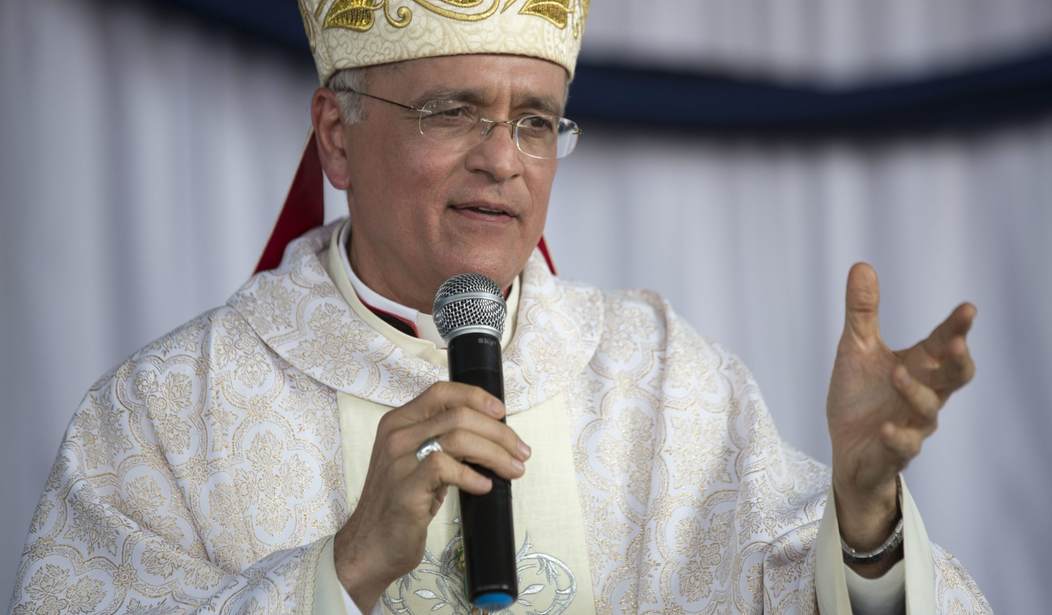As the brutal regime of Daniel Ortega continues its crackdown on protests in the Latin American country of Nicaragua, bishops have announced they will lead an exorcism prayer in an attempt to use spiritual warfare to fight government oppression. Attacks on Catholic churches and clergy in recent weeks have only further convinced the bishops that the civil unrest has a spiritual dimension.
The bishops announced that July 20 would be a day of prayer and fasting “as an act of atonement for the profanation carried out in recent months against God.” On that day, “We will pray the prayer of exorcism to St. Michael Archangel.”
The most recent violence came Sunday, after government forces had pushed a group of 200 student protesters into retreat. The students had come under fire for more than 12 hours at the National Autonomous University of Nicaragua, and two died while 15 were injured. The students sheltered in the Jesus of Divine Mercy church for 20 hours, besieged by government troops.
“They are shooting at a church,” Father Erick Alvarado Cole, a pastor at the parish, told The Washington Post. “The government says it respects human rights. Is this respecting human rights?”
This was only one of many attacks on Roman Catholic churches and clergy, however. On July 15, Bishop Juan Mata Guevara’s car was shot as he traveled to the city of Nindiri, where he hoped to stop an attack by police and paramilitary forces. The bishop escaped but the car’s tires were shot out and the windows were broken, Catholic News Service (CNS) reported.
On July 9, a pro-government mob burst into Diriamba and Catholic leaders rushed to protect St. Sebastian Basilica. The bishops claimed these leaders — a cardinal and his auxiliary, an archbishop, and the apostolic nuncio — were pummeled in the violence. The bishop and a priest were injured. Journalists were also attacked and their cameras were stolen.
“Today, like never before, human rights are being violated in Nicaragua,” the bishops declared in a July 14 statement. “Members of the national dialogue” — a group convened by the bishops to facilitate a solution to the violence — “defenders of human rights, and independent media have been the objects of campaigns of defamation by the government.”
The ring of protests erupted on April 18, when Ortega announced reforms to Nicaragua’s social security system. Protests later demanded Ortega’s ouster. The dictator has dismissed proposals for early elections and repressed protests with violence.
According to CNS, priests toll church bells to warn local populations when police and paramilitary groups arrive.
An anonymous Catholic analyst in Nicaragua told CNS that the dialogue has been interpreted as an attempt by Ortega and his wife, who is the country’s vice president, to buy time. If the bishops withdraw from the mediation, they run the risk of being blamed for the breakdown of peace talks.
Ortega and his wife “have been appropriating religious language for some time and now are saying the government is doing God’s work,” the analyst said.
The bishops reiterated their commitment to negotiations, but insisted their role goes far beyond mediation.
“Given the prophetic dimension of our ministry we have seen the urgency of going to the places of conflict to defend the lives of the defenseless, to bring comfort to the victims and mediate with the goal of a peaceful solution to the situation,” the bishops said. “The Nicaraguan church will continue to use all of the means it is able to.”
Those means include exorcism, the controversial Catholic rite of casting out demons.
In April, as protests were about to erupt in Nicaragua, Roman Catholic clergy arrived in Rome for a special conference on exorcism. Mexican priest Father Cesar Truqui, who has expelled demons for the last ten years, went to teach exorcism in Rome. He declared that “Christ was the first exorcist. The power of casting out demons was one of the first signs that Christianity was a true religion.”
Indeed, the Gospels record at least seven exorcisms performed by Jesus, along with exorcisms carried out by Jesus’ disciples and non-Christians who cast out demons in His name. The idea of spiritual warfare is very much alive across Christian denominations, and well rooted in scripture.
In Catholicism, St. Michael the Archangel is considered the leader of God’s armies (he is mentioned in the books of Daniel and Revelation). Catholics “pray to” both saints and angels in an attempt to enlist their help, but make a doctrinal distinction between such “prayer” and praying to God directly. (Many other Christians consider this a distinction without a difference.)
Whatever the merits of Catholicism’s take on exorcism, it stands to reason that there are dark forces in Nicaragua and that a prayer of exorcism may help the situation.
Whether or not Daniel Ortega’s government is demonic, many have noticed its repressive nature and called for him to step down. In May, U.S. Ambassador to the UN Nikki Haley called on Ortega to meet “the people’s demands for democratic reforms.” Without support from Nicholas Maduro’s government in Venezuela, Ortega’s regime has begun to fall apart.
At the very least, Christians should pray for a peaceful resolution to the violence.









Join the conversation as a VIP Member